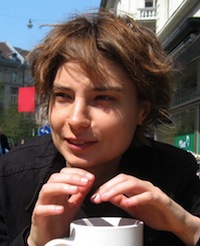Aleksandra Walczak |
ENS > Physics > LPT | CNRS |
|
Laboratoire de Physique |

|
|
The group website may contain more information.
PhD and master stage positions available. Please email me for more information on the specific projects. Information about the GDRI network Evolution, Regulation and Signalling can be found here. Paris Workshop on "Physical concepts and computational models in immunology" Postdoc position(s) open!Several postdoc positions are available to work at the interface of statistical mechanics and immunology.
The precision and reproducibility of cellular processes poses a challenge to many-body physics and our understanding of the physical principles that control the emergent properties of biological systems. In my research I study the behaviour of such strongly coupled nonlinear systems that are not in equilibrium, mostly inspired by existing biological solutions. My main interest lies in the description of systems on the cellular scale - understanding the link between function, development and evolvability of conserved pathways and their elements. Potentially interested students, please contact me for concrete long and short term projects, in both biological and non-animate systems (mostly glasses). My recent focus has been on a number of concrete, not disjoint, topics: gene regulatory networks, collective behaviour the immune system and population genetics. Progress in the experimental characterization of existing gene regulatory networks in organisms of varying complexity, allows us to ask which forms of regulation are best suited to perform specific task. How is this regulation encoded in the molecular components of the network? These questions require formalizing the task and describing large scale stochastic molecular systems. The immune system is a specific biological system, with the function to recognize (and hopefully kill) pathogens. The broad goal is to use existing experimental data to learn probabilistic models and study the form and dynamics of the encoding of this complex function. Collective behaviour in living systems challenges our micro and mesoscopic theories of matter. As in the immune system, I am interested in linking the observable and the microscopic scale and finding the right scale to describe the equations of motion. To describe the diversity of existing genes, or more broadly genotypes, we need to consider how selection and mutation act on sites which evolve together. These questions can be tackled in a probabilistic framework, which tries to infer the evolutionary processes responsible for the observed variability. I am interested in developing theoretical descriptions to see how interactions between molecular components in the cell influence and/or determine observed phenotypes. |
Funding:

|

|

|